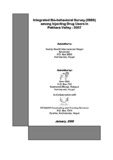Please use this identifier to cite or link to this item:
https://hdl.handle.net/20.500.14356/660| Title: | Integrated Bio-behavioral Survey (IBBS) among Injecting Drug Users in Pokhara Valley – 2007 |
| Authors: | Family Health International/Nepal |
| Issue Date: | 2008 |
| Publisher: | Family Health International/Nepal |
| Keywords: | Drug Users Pokhara Valley |
| Abstract: | Summary: The National Center for AIDS and STD Control (NCASC), Nepal has developed a comprehensive National Surveillance Plan for HIV and AIDS that includes Integrated Biological and Behavioral Survey (IBBS) that is conducted at regular intervals among most at risk populations (MARPs).These surveillance studies are aimed at assessing health risk behaviors and measuring the prevalence of HIV and Sexually Transmitted Infections (STIs) among MARPs as well as monitoring trends in epidemic to inform the HIV response in Nepal. The IBBS is conducted by NCASC with technical and financial support from Family Health International/Nepal and the United States Agency for International Development (USAID). The current MARPs included in this IBBS are injecting drug users (IDUs), female sex workers (FSWs) and men who have sex with men (MSM). This report details the findings of the third round of the IBBS conducted among 300 male IDUs in the Pokhara Valley. The primary objective of the study was to collect strategic information to analyze trend in risk behavior and HIV and STIs among IDUs. It is a challenging task to collect information from high-risk population group such as IDUs, FSWs and MSM. These groups are highly stigmatized and potential respondents may be reluctant to come forward to participate in research studies. Innovative sampling methods are needed in order to reach these individuals. The most effective method developed to date is Respondent Driven Sampling (RDS). RDS methodology is a relatively new adaptation of chain referral sampling where subsequent respondents are recruited by previous respondents through their network of acquaintances. RDS methodology was used in this study to recruit 300 male IDUs. In the first stage of RDS a list of locations where the IDUs inject drugs and gather frequently was prepared for the sampling design. In the second stage, a structured questionnaire was administered to the respondents at centrally located study clinics. The questionnaire collected information on sexual behavior and HIV/AIDS awareness as well as socio-demographics. Interview was followed by clinical examination by a Health Assistant and collection of blood samples for biological testing of HIV and Syphilis. Study centers with laboratories/clinics were set up at Prithvi Chowk in Pokhara. Samples were collected only after pre-test counseling sessions were held. The participants were also provided syndromic treatment for STI symptoms if warranted. HIV and syphilis test results were provided later at Naulo Ghumti where experienced counselors provided post test counseling. |
| URI: | http://103.69.126.140:8080/handle/20.500.14356/660 |
| Appears in Collections: | Post Graduate Grant (PG) Reports |
Items in DSpace are protected by copyright, with all rights reserved, unless otherwise indicated.

